BERAS publications
Sustainable agriculture within the Baltic Sea Region
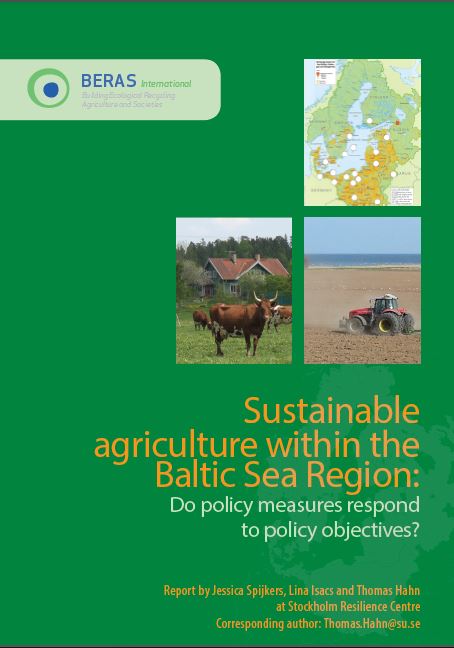
Resilience of our ecosystems is at stake. Despite various measures the eutrophication of the Baltic Sea is not decreasing and the resilience of multiple ecosystems is at stake. In this situation business as usual is not an option. New approaches are needed creating a safe operating space within the environmental boundaries. BERAS develops and implements practical examples where innovation and entrepreneurship from a multi sectorial engagement flows into realistic fully integrated ecological alternatives for the whole food chain from farmer to consumer.
Farming for the Future – with a focus on the Baltic Sea Region
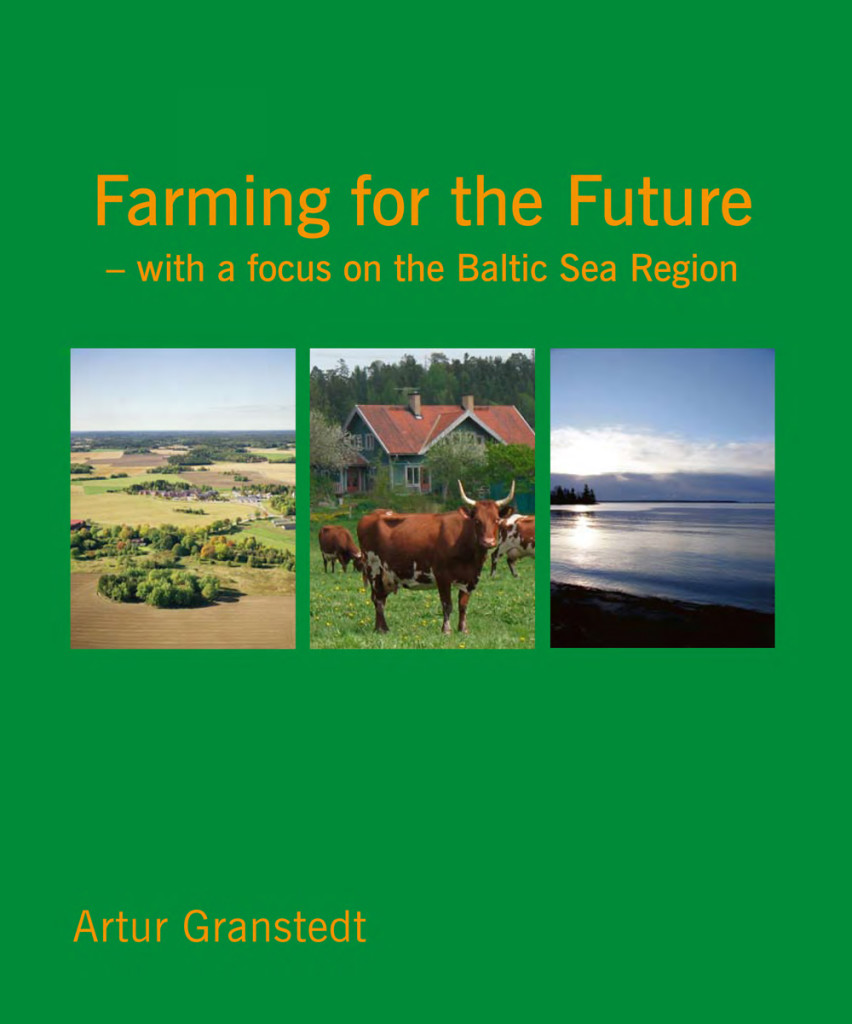
In this book Artur Granstedt, Ph.D. in Agronomics and Associate Professor at Södertörn University, Sweden, and Coordinator of BERAS, the Baltic Sea project at the University, describes how ecologically adapted farming based on local recycling and renewable energy sources can reduce the eutrophication of the Baltic Sea and even help to reduce global warming. Widespread conversion to organic farming methods would furthermore stop the spread of toxic chemicals on farmland, benefit biodiversity and stimulate social and economic development in rural areas in the Baltic Sea region. The book starts with a description of the ecosystems that support the health of the biosphere – terrestrial and marine, the climate, and global food production. Granstedt also gives a historical overview of agricultural practices, noting the various ways in which human activity alters the natural order of things and, if we are not mindful, can deplete the resources that support our existence. But he also gives examples of how we can turn negative trends to the better, how we can restore fertility to the soil and bring depleted land to bloom once again and produce nourishing food that can feed the world.
Artur Granstedt writes on the basis of decades of experience as an organic farmer, researcher, adviser and teacher of ecologically sustainable agriculture. The book reports the results of field trials and evaluations on farms in eight countries around the Baltic Sea that were conducted in the project, Baltic Ecological Regenerative Agriculture and Society(BERAS). This comprehensive project, which was supported in part by funding from the European Union, is now continuing in an implementation phase, focusing on how agriculture throughout the region can be converted to profitable and ecologically sustainable methods of production.
Conversion to Ecological Recycling Agriculture and Society – Environmental, economic and sociological assessments and scenarios
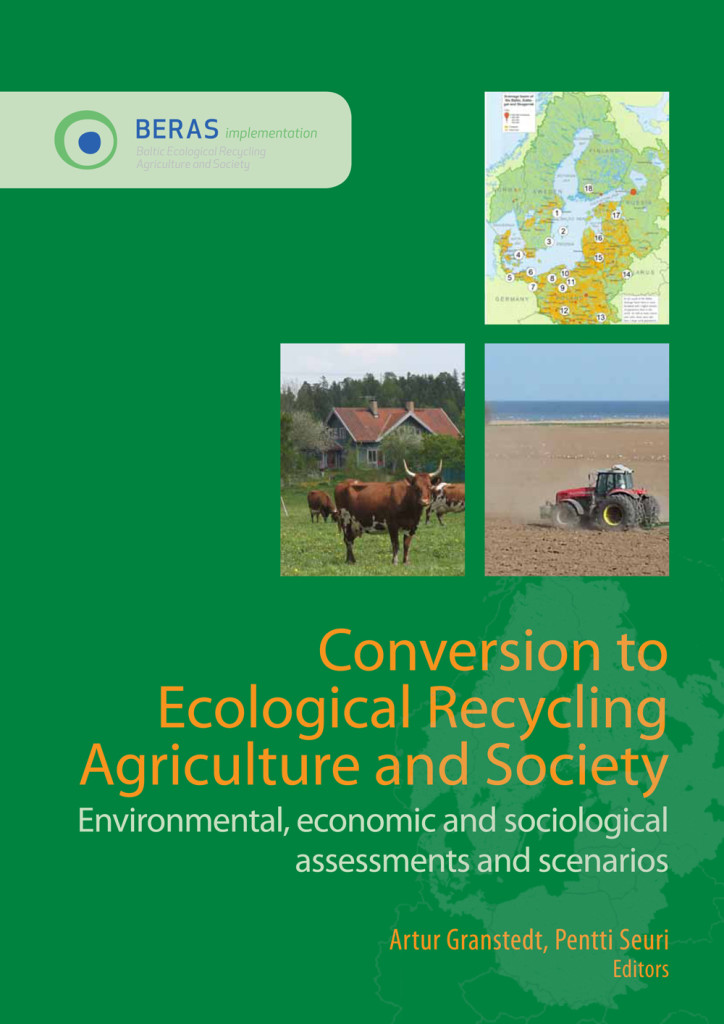
This report gathers the scientific results of the environmental, economic and sociological assessments and scenarios within the BERAS Implementation project. It includes theoretical frameworks, production models and evaluations of the conversion process based on a number of ERA case studies. Environmental impacts of farming systems, economic perspectives on conversion as well as policy recommendations for supporting a shift to ERA are presented.
BERAS - For people who eat food
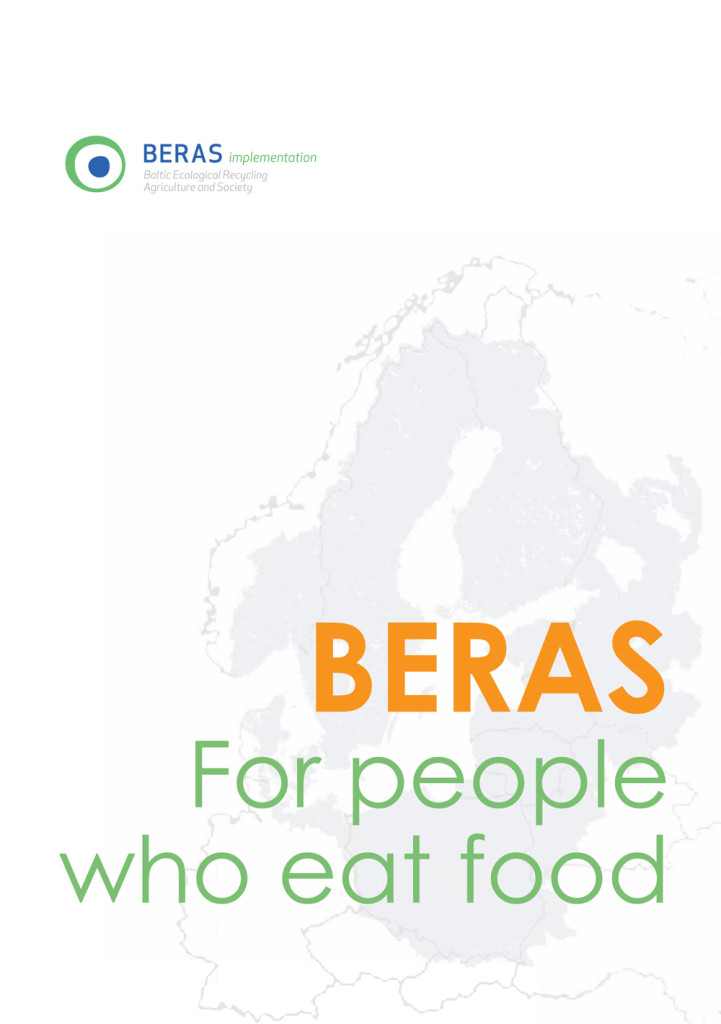 Are we eating our planet?
Are we eating our planet?
According to the UN, the food sector is responsible for 50% of the global climate change. The main problem is how we produce our food.
With today’s industrialised agriculture we destroy our fertile land and threaten biodiversity of plants and animals. This means that ecosystems, which all life depends on, disappear.
To feed the world we need to use our resources more carefully. More than half of our agricultural land is used for meat production. This consumes land, water and energy, often in areas that used to be covered by rainforest. Industrialised animal farms also produce huge amounts of manure that are not returned to the soil, but leak out into lakes and seas and cause dead sea beds. This type of intensive meat production threatens animal welfare, the environment and the possibility to produce enough food for everyone.
The food sector today is also totally dependent on non-renewable fossil fuels. They are used to produce artificial fertilisers, when we instead
could use natural fertilisers provided by the farm. We transport our food and fodder for animals around the entire globe, which adds to greenhouse gas emissions.
We are in fact eating our planet. What can we do to change this?
Sustainable Food Societies - Information Centres and Farms
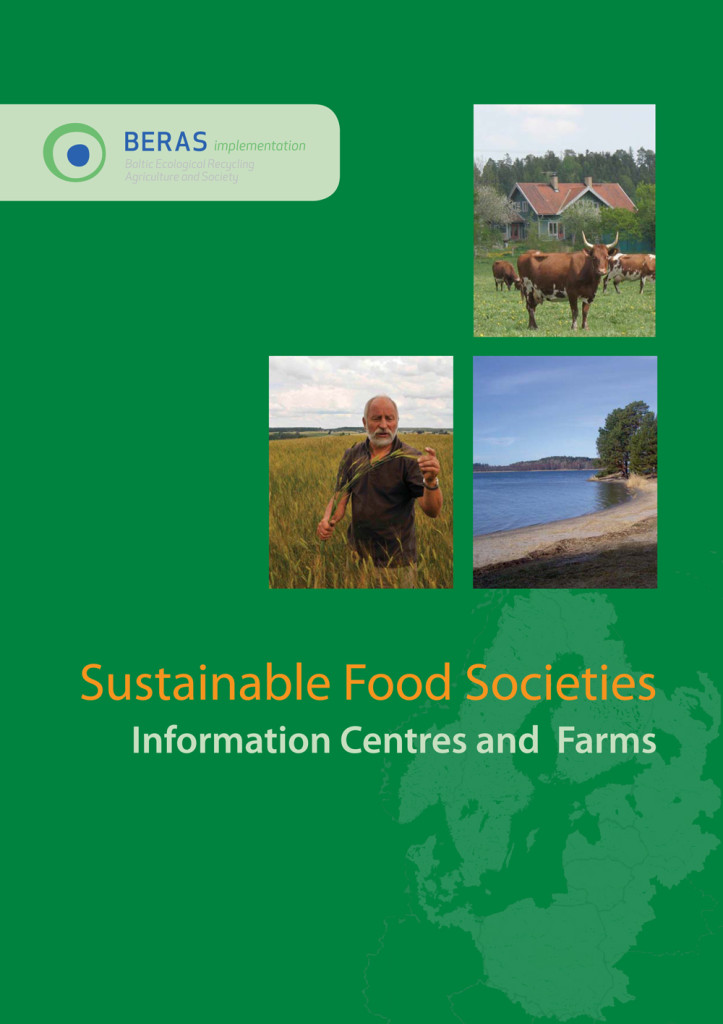
Sustainable Food Societies are examples of local food clusters that are socially just, environmentally friendly and economically viable.
BERAS Implementation – Agriculture for a Sustainable Future
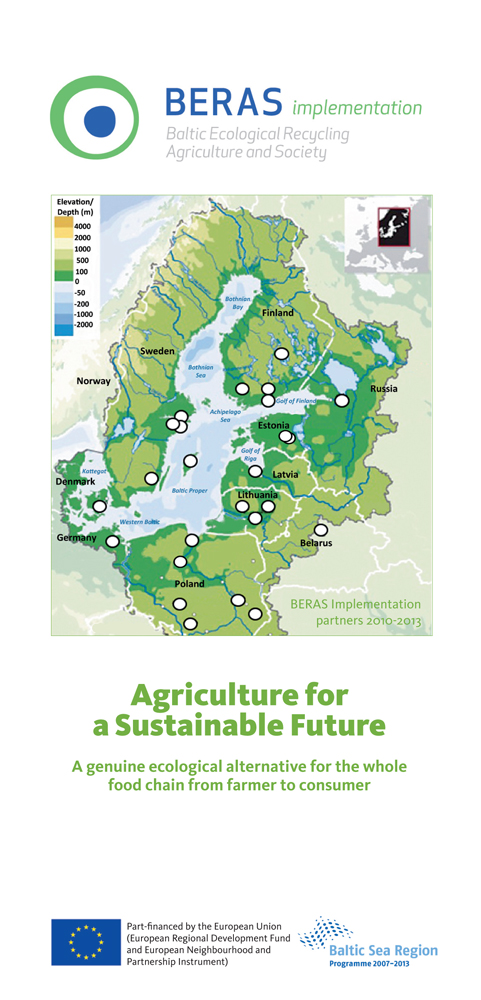
Reports from BERAS 2003-2006
The results from research carried out in BERAS project (2003-2006) form the basis for the current BERAS Implementation project (2010-2013) and are made available in seven reports. These reports together with an executive summary can be accessed below.
BERAS Executive Summary
Granstedt. A. 2007. Baltic Ecological Recycling Agriculture and Society (BERAS) Executive Summary
BERAS Report nr 1
BERAS Report nr 2
BERAS Report nr 3
BERAS Report nr 4
BERAS Report nr 5
BERAS Report nr 6
BERAS Report nr 7
BERAS related peer-reviewed publications
Granstedt, A. & Kjellenberg, L. 2008. Organic and biodynamic cultivation – a possible way of increasing humus capital, improving soil fertility and be a significant carbon sink in Nordic conditions. Second Scientific ISOFAR Conference in Modena 18-20 June 2008.
Granstedt, A., Tyburskij, J., Stalenga J. 2007. Nutrient Balances in Organic Farms. Baltic Sea project BERAS (Baltic Ecological Recycling Agriculture and Society), results from Poland. In: Scientific Agricultural conference Poznan August, 2007.
Granstedt, A. 2000. Increasing the efficiency of plant nutrient recycling within the agricultural system as a way of reducing nutrient pollution to the Baltic Sea. Agriculture, Ecosystems & Environment 1570 (2000) 1–17. Elsevier Science B.V. Amsterdam
Granstedt, A., L-Baeckström, G. 2000. Studies of the preceding crop effect of leys in ecological agriculture. American Journal of Alternative Agriculture, vol. 15, no. 2, pages 68–78. Washington University.
Granstedt, A. 1995. Studies on the flow supply and losses of nitrogen and other plant nutrients in conventional and ecological agricultural systems in Sweden. Biological Agriculture and Horticulture. vol. 11, 51–67.
Granstedt A. 1992. Case studies on the flow and supply of nitrogen in alternative farming in Sweden. Biological Agriculture and Horticulture 9:15-63.
Helmfried, H., Haden, A. and Ljung M. 2007. The Role of Action Research (AR) in Environmental Research: Learning from a Local Organic Food and Farming Research Project. Journal Systemic Practice and Action Research.
Larsson, M., Granstedt, A. and Thomsson, O. 2011. Sustainable Food System –Targeting Production Methods, Distribution or Food Basket Content? . In Tech – Organic Food and Agriculture / Book 1.
Nousiainen, M., Pylkkinen, P., Saunders, F., Seppinen, L., and Vesala, K.M. 2009. Are Alternative Food Systems Socially Sustainable? A Case Study from Finland. Journal of Sustainable Agriculture, Volume 33, Issue 5 July 2009 , pages 566 – 594.
Conference presentations
Resource Efficiency in Ecological Regenerative Agriculture with Dairy Production
IDF World Dairy Summit, Vilnius, Lithuania, September 2015
Conference Manager: Piercristiano Brazzale – Brazzale Spa Company, Orrero a.s. (Italy) Representative of the local Organising Committee: Laima Česonienė – Aleksandras Stulginskis University (Lithuania)
Session 4 – Closing the Nutritional Gap with Sustainable Dairy Increasing Resource Efficiency in Dairy Production: Analysis Along the Supply Chain
Presentation by Artur Granstedt : Migration of Nutrients in the Environment of the European Dairy Sector
Soils and the Food We Eat, May 19-21, 2015
(with support from Stockholms Läns Landsting).
A high level BERAS conference in Ytterjärna, Södertälje, Sweden
Presentations from May 19th:
Jostein Hertwig – CEO, BERAS International
Agr Dr Artur Granstedt – Ecological Regenerative Agriculture (ERA)
Dr Jackie Swartz – Organic/biodynamic diet and allergic sensitization in childhood
Presentations from May 20th:
Agr Dr Artur Granstedt – Ecological Regenerative Agriculture (ERA)
Dr. S. Natarajan/Dr. K. Perumal (India) – BERAS International outlook- India
Dr. César López (Dominican Republic) – The Caribbean Region
Presentations from May the 21st:
C B Kavishe – Agriculture in Babati – Tanzania
C B Kavishe – The Food Chain in Babati – Tanzania
Father Clement – Soil to Oil Model Farming – India
Lucas Dengel – EcoPro Auroville – India
Mahesh Melvin – the Nilgirish _ India
Sangita Kamath – DGP in Bangalore Steiner School – India
X International Interdisciplinary Scientific Research Congress – 2014
In Santa Domingo, Dominican Republic
BERAS presentations:
Jostein Hertwig – 13 June 2014
Agr Dr Artur Granstedt – 13 June 2014


